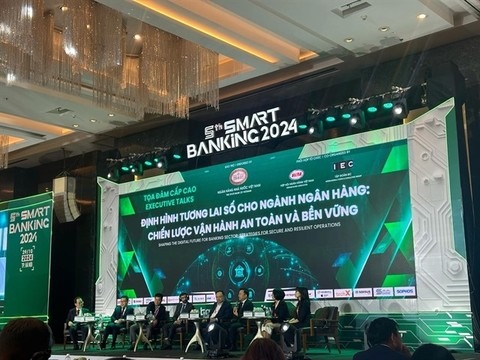|
Smart banking emerges as more than just a technological trend
In 2024, smart banking is evolving beyond a mere technological trend. It is becoming a strategy for sustainable development that fosters collaboration among banks to share experiences, learn and grow together.

Phạm Tiến Dũng, Deputy Governor of the State Bank of Vietnam (SBV) spoke at the event. — VNS Photos
|
This focus on sustainability in banking was emphasised by Phạm Tiến Dũng, Deputy Governor of the State Bank of Vietnam (SBV), during the Smart Banking Conference-Exhibition 2024, held in Hà Nội yesterday.
In his opening speech, themed 'Shaping the Digital Future for the Banking Sector: Strategies for Secure and Resilient Operations', Dũng highlighted the banking industry’s open legal framework that promotes digital banking, setting it apart from other sectors in terms of achievements.
The SBV has pioneered initiatives such as enabling eKYC-based account opening since 2021 and more recently, from October 1, 2024, allowing account openings using chip-embedded citizen IDs, thereby supporting fully online guarantees and lending. This legal foundation is crucial for the technological integration of the banking sector.
Vice Chairman and General Secretary of the Vietnam Banks Association (VNBA), Nguyễn Quốc Hùng, echoed these sentiments, noting that digital transformation in banking—both globally and in Việt Nam—is at a pivotal moment.
Innovations such as big data, AI, machine learning, augmented reality and open banking platforms are propelling this shift, making smart banking a cornerstone of a sustainable, tech-forward banking landscape.
Hùng pointed out that the Information Technology Development Strategy and the Digital Transformation Plan for the Banking Industry, along with regulatory frameworks like the Law on Credit Institutions 2024, the Decree on Non-Cash Payments and various circulars governing electronic account opening, guarantees, lending and information security, have collectively driven significant advancements in the sector's digital transformation efforts.
This analysis underscores the substantial progress in banking technology, highlighting the enhanced quality and convenience of e-banking services. By leveraging key technologies, credit institutions have successfully modernised banking operations, particularly in management, data analysis and customer support, providing a seamless, 24/7 experience.

A panel takes questions raised by participants at the event. — VNS Photos
|
The surge in digital transactions reflects the effectiveness of these developments, with some banks now conducting over 90 per cent of transactions through digital channels. More than 80 per cent of adults in Việt Nam hold payment accounts.
Notably, the credit institution system has amassed around 200 million customer records, including 46.7 million biometric-verified accounts. The financial switching and clearing system processes over 20 million transactions daily, while the interbank electronic payment system handles an average daily transaction value exceeding VNĐ830 trillion (approximately US$32.5 billion), showcasing an impressive annual growth rate of 23.5 per cent.
Continuous investments in banking technology ensure alignment with international standards, demonstrating the sector's commitment to innovation and efficiency. Deputy Governor Phạm Tiến Dũng remarked on the significant strides in banking digitalisation, with transaction rates on digital channels reaching approximately 97-98 per cent for many commercial banks. The annual growth rate remains robust, with double-digit increases in both transaction volume and value, reflecting a high level of digital integration within the sector.
The banking industry’s integration with sectors like the Ministry of Public Security and telecommunications further illustrates its interconnected role in the economy. However, as banks connect with various external systems, they face heightened risks related to security and operational continuity.
Dũng stressed the importance of maintaining operational safety and quality as digital offerings expand, urging banks to focus on enhancing the quality and security of their products and services to ensure comprehensive and resilient digital transformation.
Hùng echoed concerns regarding emerging risks to the sustainability of the banking industry, particularly the rise in security threats and information breaches. Advanced Persistent Threats (APT) targeted at the Vietnamese banking sector by organised crime groups, as well as increased instances of customer fraud, pose significant challenges. These threats highlight the urgent need for robust defenses as banks progress in their digital transformations.
While adopting new technologies brings substantial benefits—such as fostering new ecosystems, innovative business models, open banking, and enhanced customer experiences—these advancements must be balanced with secure and reliable operations.
Hùng emphasised that accelerating digital transformation while maintaining operational and information security is vital for the banking industry. Given the global rise in cybercrime, he stressed that information security is not only a priority for Vietnamese banks but also a shared global concern as technology evolves alongside non-traditional security threats.
Speaking alongside the event about information security in the banking sector, Tan Bin Ru, President of Enterprise (Digital) at ST Engineering, stated that three fundamental principles ensure data protection and resilience: encryption, integrity and availability. She introduced advanced cybersecurity offerings, including WizKnight Cloud for securing communications for remote users and SCALE, a comprehensive solution that safeguards data and reinforces virtual desktop security. These solutions enhance secure remote access and connectivity across on-premises and cloud platforms, ensuring data confidentiality, integrity, and availability. The ongoing research in quantum key distribution prepares solutions for a quantum-ready future.
Continuous monitoring to detect threats and vulnerabilities in a bank's infrastructure, along with effective employee training, is essential for improving security, she said. We offer advanced solutions for monitoring and responding to cyber threats, including supply chain cybersecurity monitoring, cloud investigation and response automation and realistic simulations of cyber threats as part of our comprehensive cybersecurity suite.
In summary, our solutions empower banks to secure access to information and respond more swiftly to incidents, leading to more effective risk management, she noted.
Bizhub
|